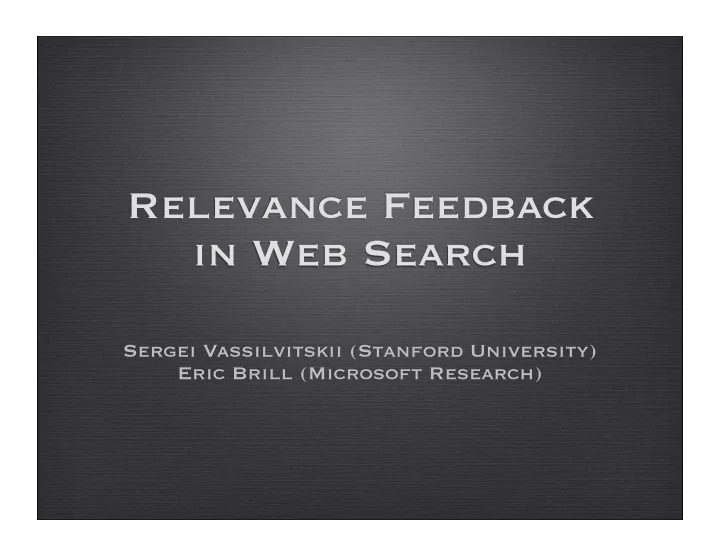

Relevance Feedback in Web Search Sergei Vassilvitskii (Stanford University) Eric Brill (Microsoft Research)
Introduction • Web search is a non-interactive system. • Exceptions are spell checking and query suggestions • By design search engines are stateless • But many searches become interactive: • query, get results back, reformulate query... • Can use interaction to retrieve user intent
Relevance Feedback
Using This Information • Classical methods: e.g. Rocchio’s term reweighing (TFiDF) + cosine similarity scores. • There is more information here: what can the structure of the web tell us?
Hypothesis • For a given query: • Relevant pages tend to point to other relevant pages. ➡ Similar to Pagerank.
Hypothesis • For a given query: • Relevant pages tend to point to other relevant pages. ➡ Similar to Pagerank. • Irrelevant pages tend to be pointed to by other irrelevant pages. ➡ “Reverse Pagerank” ➡ Those who point to web spam are likely to be spammers.
Dataset • Dataset • 9500 queries • For each query 5 - 30 result URLs • each URL rated on a scale of 1 (poor) to 5 (perfect) • Total 150,000 (query, url, rating) triples • Will use this data to simulate relevance feedback • Only reveal the ratings for some URLs
Hypothesis Validation Baseline • Relevance distribution of all URLs in the dataset 0.4 0.3 0.2 0.1 0 1 2 3 4 5
Hypothesis Validation Baseline Perfect Targets • Relevance distribution of all URLs in the dataset 0.4 0.3 • Compared to the URLs that are targets 0.2 of perfect results 0.1 0 1 2 3 4 5
Towards an Algorithm url 1 url 2 url 3 url 4 url 5 url 6
Towards an Algorithm url 1 url 2 url 3 url 4 url 5 url 6 unrated result good result bad result
Towards an Algorithm url 1 url 6 url 2 url 4 url 5 url 3 unrated result good result bad result
Towards an Algorithm url 1 url 6 url 2 url 4 url 5 url 3 unrated result good result bad result
Towards an Algorithm url 1 url 2 url 2 url 6 url 3 url 1 url 4 url 4 url 5 url 3 url 6 url 5 unrated result good result bad result
Percolating the Ratings • Calculate the effect on u • Begin with a probability distribution on relevance of (Baseline histogram) u • For all highly rated documents v • If there exists a short path, update . v → u u • For all irrelevant documents v • If there exists a short path, update . u → v u • Combine the static score together with the relevance information
Algorithm parameters • If there exists a “short” path... • Strength of signal decreases with length • Recall of the system increases with length • Computational considerations • Looked at paths of 4 hops or less
Algorithm parameters • If there exists a “short” path... • Strength of signal decreases with length • Recall of the system increases with length • Computational considerations • Looked at paths of 4 hops or less • ...update . u • Maintain a probability distribution on the relevance of . u
Experimental Setup • For each query in the dataset split the URLs into • Train: the relevance is revealed to the algorithm • Test: Only the static score is revealed • Compare the ranking of the test URLs by their static score vs. static + RF scores.
Evaluation Measure • Measure: NDCG (Normalized Discounted Cumulative Gain): 2 rel ( i ) − 1 � NDCG ∝ log(1 + i ) i • Why NDCG? • sensitive to the position of highest rated page • Log-discounting of results • Normalized for different lengths lists
Result Summary • NDCG change for Alg Rocchio three subsets of pages. 4 • Complete Dataset 3 2 1 0 -1 Roccio: Demotes the best result
Result Summary • NDCG change for Alg Rocchio three subsets of pages. 4 • Complete Dataset 3 • Only queries with 2 NDCG < 100 1 0 -1
Result Summary • NDCG change for Alg Rocchio three subsets of pages. 4 • Complete Dataset 3 • Only queries with 2 NDCG < 100 1 • Only queries with 0 NDCG < 85 -1 Increased performance for harder queries
Result Summary (2) • Recall for the three Alg Rocchio datasets. 30.0 • Complete Dataset • Only Queries with 22.5 NDCG < 100 15.0 • Only Queries with NDCG < 85 7.5 0
Results Summary (3) • Many more experiments: • How does the number of URLs rated affect the results? • Are some URLs better to rate than others? • Can we predict when recall will be low?
Future Work • Hybrid Systems: Combining text based and link based RF approaches • Learning feedback based on clickthrough data • Large scale experimental evaluation of different RF approaches
Thank You Any Questions?
Recommend
More recommend